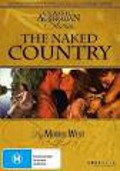
Australia 1985
Directed by
Tim Burstall
90 minutes
Rated M
Reviewed by
Bernard Hemingway

Morris West's The Naked Country
Tim Burstall’s film is quite a retrograde affair, playing like a '60s Hollywood Western with its relatively tokenistic recognition of the point of view of the indigenous inhabitants but ultimately celebrating the triumph of the white alpha male (there a Kirk Douglas, here John Stanton) over his weaker (physically, mentally, morally etc) native opponents with so little regard for authenticity as to cast an Indian, Neela Dey (who had played June Morosi in the 1983 teleseries, The Dismissal), as the Aboriginal woman whose sexual allure precipitates the chain of events that leads to a confrontation between the races. Yet on the other hand the film is an early appearance of land rights issues in Australian film and considerable success is achieved in portraying Aboriginal society at the time the film is set, the 1950s, and the relations between it and the white settlers.
Based on Morris West’s potboiler about a sexually-frustrated drover’s wife, Mary (here played by Rebecca Gilling), her neglectful husband, Lance (Stanton), and a young policeman (Ivor Kants), it was Burstall who foregrounded the land rights aspect of the film and indeed he never seems comfortable with the lust-in-the-dust melodramatics that apparently formed the core of the West novel (given the significant changes I do not know why West is given such authorial prominence).
The film abounds with sexual allusion but this is largely centred around the relations between Stanton and Tommy Lewis (who had played the lead in Fred Schepisi’s comparable The Chant Of Jimmie Blacksmith, 1978), the Aboriginal, Mundara, who is responsible for killing Lance’s stud bull (subtle, this film is not) with Burstall disappointingly giving short shrift to the relation between Mary and her uniformed lover. The two halves of the film never come together with both Gilling, no-one’s idea of an outback wife, and Kants in under-developed roles merely floating around on the edges of the main event. David Eggby’s photography is a real treat and for all its shortcomings, some of which were no doubt caused by the circumstances of a hurried production, it is a economical effort and in its transgressive way, an engaging-enough film.
DVD Extras: A interview with Rebecca Gilling and an informative audio interview with co-writer and producer, Ross Dimsey.
Available from: Umbrella Entertainment
Want something different?





